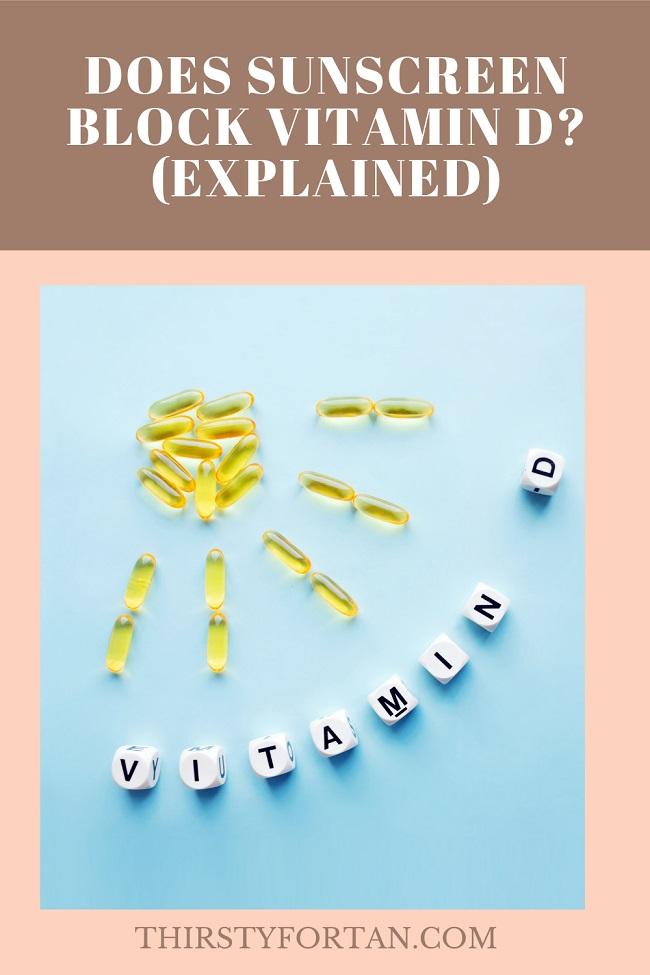There are many benefits of using sunscreen to protect your skin from the Sun, and it’s definitely a product which you should be using every day, even when it’s not hot outside, without a doubt. The use of sunscreen is scientifically proven to prevent the risk of the most fatal skin cancer, melanoma, as well as reducing other things, like premature aging.
Nevertheless, you may be skeptical about the effects and potential negative impacts of using sunscreen in your everyday life, just as you may with any other product, so here are all the facts you need to know about sunscreen, and whether it blocks out vitamin D.
What is vitamin D?
The chances are, you’ve probably heard of the term ‘vitamin D’ before, but it’s not something which is really discussed very often, except for in a medical environment, so you may not know what it means. This is completely fine, and it’s great to know about vitamin D, and the benefits of it for your body, as well as how you need it. Of course, this vitamin has lots of uses and applications in all parts of your life, and it is very important for various bodily functions to take place.
Firstly, a vitamin is something which our body requires in order to properly function in all the ways it must, and different vitamins contribute to different things. They are essential for our daily life, and can be sourced from all sorts of things, such as the environment we live in or the food we eat. There are lots of different vitamins that are all necessary for our body, and vitamin D is one of them.
There are a variety of benefits of vitamin D in the body, and also some mechanisms that need vitamin D in order to perform, but we’ll talk about those later.
How does vitamin D benefit your body?
In your body, among the various different mechanisms which take place, vitamin D regulates, or at least helps to regulate, your calcium and phosphate levels. These are two nutrients, which are also essential for your body to work, and they are responsible for keeping teeth, bones and muscles intact. Of course, there are some other benefits of vitamin D for the body, but this is the main one, and a very important one, too!
By regulating and keeping up your calcium and phosphate levels, your body is helped to be protected against lots of different diseases and conditions, such as osteoporosis and rickets, which are both types of bone conditions. Rickets is a bone deformity found in children, which can have a domino effect in later life, opening the door to other potential problems. Osteoporosis is a common condition caused by vitamin D deficiencies, which gradually weakens the bones as you get older, and makes your body more fragile and your bones more prone to breakage, as well as causing discomfort.
Some additional benefits of vitamin D in the body include:
- Boosted weight loss: some studies have shown that vitamin D can trigger an effect which suppresses your appetite, therefore preventing you from eating more than you need to when on a diet.
- Reduced depression: while it’s not an official treatment, vitamin D is thought to have some effect in regulating moos and has been shown to reduce depression.
- Lowered risk of heart disease: although it’s not clear why, some studies have shown that vitamin D can, in fact, lower your risk of heart disease.
- Fighting disease:, as well as heart disease, higher levels of vitamin D in the body, have been shown to reduce the likelihood of developing diseases such as the flu or reducing your risk of multiple sclerosis (MS).
How do we get vitamin D?
As well as the benefits of vitamin D, there are many different ways in which you can get vitamin D, which is something you should definitely know after reading this.
The primary source of this vitamin is sunlight, and exposure to it can trigger vitamin D production in your body. Cholesterol is found in the skin cells and, when this is hit by the UVB rays from the Sun, the energy is provided for your body to turn this cholesterol into exactly what you need, and this process is called vitamin D synthesis.
Although there are other ways in which your body gets vitamin D, such as from eating certain foods, this is the only one you need to know at the moment, and it’s the only one which applies to this topic.
Does sunscreen block vitamin D?
If you know anything about sunscreens, you’ll know that they are physically designed to prevent both types of UV rays, UVA and UVB, from getting to your skin. If the main source of our vitamin D levels comes from the UVB rays, doesn’t that mean that sunscreen prevents our bodies from being able to make vitamin D? Although theoretically, this does make sense, there’s no need to panic, as you are not being deprived of your vitamin D levels when wearing your sunscreen, and there are a few reasons why.
To answer this question, you need to take a look at the different protection levels available from sunscreens, and how much UVB they block out. On a sunscreen, the SPF number which is labeled on the packaging is a measure of the UVB which is filtered out by the product, so this is all you need to look at. Interestingly, SPF 30 filters out 97% of UVB, while SPF 50 filters out 98%, which is only 1% more.
If you look at the figures above, even SPF 50, the highest level of protection recommended for regular use, doesn’t block out 100% of the UVB rays, still allowing at least 2% to get through to the skin. Although 2% doesn’t really seem like much, it is a healthy amount and should be capable of providing enough for your body to produce sufficient levels of vitamin D.
One thing you should also think about is that most people, despite the fact that they should, don’t wear a decent sunscreen regularly, especially not in the winter. Of course, you don’t need a high of an SPF when it is colder, but you still need one, nevertheless. However, if most people aren’t even using sunscreen every day, insufficient vitamin D levels is something you shouldn’t even need to worry about!
Not to mention, there are other ways in which your body gets its supply, through other means, such as your food, and you can also find out how to increase your vitamin D intake later on.
In short, yes, sunscreen blocks out vitamin D to an extent, but no, it doesn’t block out too much.
Why is it bad for your sunscreen to block vitamin D?
Although sunscreens generally don’t block out too much vitamin D, it’s interesting to know what would happen if they did, and why people are worried about it. Remember, your sunscreen does block out UVB to an extent, which is completely necessary, but it’s a safe level.
If we lived in a world where your sunscreen did happen to block out too much vitamin D, many more people would be living with something which is known as a ‘deficiency’. Even though this isn’t the case for our world, people do still live with vitamin D deficiencies, but usually for other reasons.
A deficiency is a condition when your body does not get enough of something which it needs in order to function, such as vitamins, due to a certain reason. Some deficiencies are things people are born with, while others are a result of lifestyle choices.
It would be bad for your sunscreen to block out too much vitamin D because that would lead to deficiencies amongst lots of people, and these deficiencies could develop into certain conditions such as osteoporosis in adults or rickets in children, as listed earlier.
How can you increase your vitamin D intake?
If you are still worried about not getting enough vitamin D, or you are just looking for ways to increase your intake to prevent conditions in the future, you’ll be happy to hear that there are ways you can do this. Here is a handy list of things you can do:
- Spend more time outside: seeing as your vitamin D intake comes primarily from sunlight, the more time you spend outside, the more you’ll make! As long as you make sure you’re wearing appropriate protection of sunscreen and staying safe, this is a great one, and it helps you to get some fresh air at the same time!
- Open the blinds: as effective as it is to spend more time outside, we all know that’s not always possible, especially when you take into account working, a busy schedule, or unpredictable weather. One quick fix you can make is to let in as much natural light as you can during the days and, if it’s possible, work near a window for maximum sunlight!
- Use an appropriate SPF: of course, wearing sunscreen all the time is necessary, but it’s also good to consider the conditions and use that to judge which one you use. During the summer, you need at least SPF 30, or even 50, but when it’s not so sunny, why wear something that heavy? During winter months, especially when the days are shorter and the sky is greyer, SPF 15 or 20 should suffice. In other words, just be sensible with what sunscreen you’re using.
- Take a supplement: there are plenty of nutritional supplements available to suit your lifestyle and, if you’re concerned about your vitamin D intake, you can always incorporate a suitable supplement into your daily routine.
- Consider eating foods rich in vitamin D: the foods you eat can have a major effect on your vitamin and mineral intake, and there are certain foods which have high levels of vitamin D to boost yours. Some examples include fish oils and fatty fish (salmon, herring, sardines, cod liver oil, canned tuna), egg yolks, mushrooms, and fortified foods (orange juice, cow’s milk, cereal, oatmeal, soymilk)
- Immune, muscle, teeth and bone health support supplement: contains one 100 count bottle of Nature Made Vitamin D3 2000 IU (50 mcg) Tablets for a 100-day supply
- Nature Made Vitamin D 2000 IU tablets support bone health, teeth health, muscle health, and provide immune support
- Immune, muscle, teeth and bone health support supplement: contains one 90 count bottle of Nature Made Extra Strength Vitamin D3 5000 IU (125 mcg) Softgels for a 90-day supply
- Nature Made Vitamin D 5000 IU softgels help improve calcium absorption, support bone health, teeth health, muscle health, and provide immune support
- An essential Vitamin: Vitamin D is an essential nutrient for healthy bones, teeth, muscle function, and immune system support. The mayo Clinic estimates that 25%-50% of the general population may be Vitamin D deficient.
- Sunshine In a Bottle: The Vitamin D Council recommends daily vitamin D supplementation for most adults to achieve and maintain optimal levels, regardless of weather or season.* NatureWise Vitamin D3 is all natural, non-GMO, and gluten free with no artificial additives, fillers or binders.
If you click Buy on Amazon and make a purchase, I'll earn a small commission at no additional cost to you.
Final thoughts
Overall, it’s safe to say that sunscreens do, in fact, block out vitamin D, but not all of it. The amount of vitamin D blocked out by sunscreens are only healthy, and keeps us safe, preventing skin problems in the future. For these reasons, you shouldn’t worry about your sunscreen blocking out too much vitamin D, but there are ways to increase your intake if you’re worried about it!







